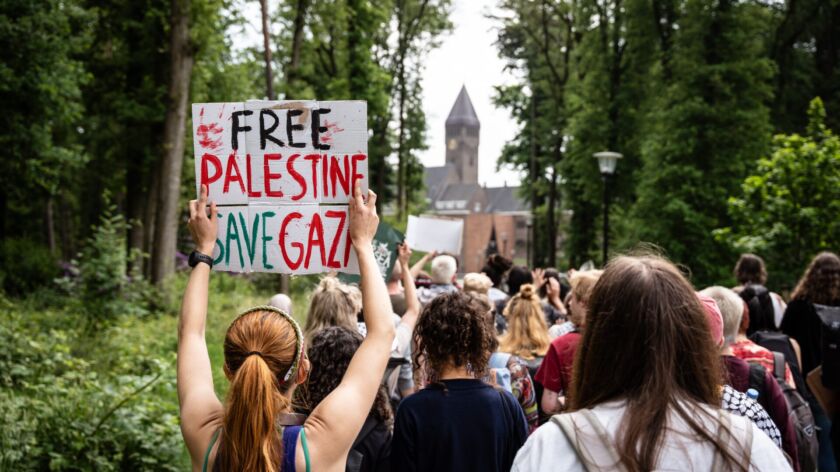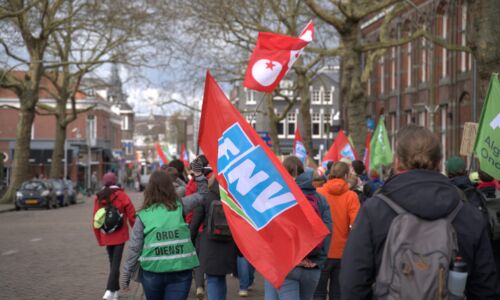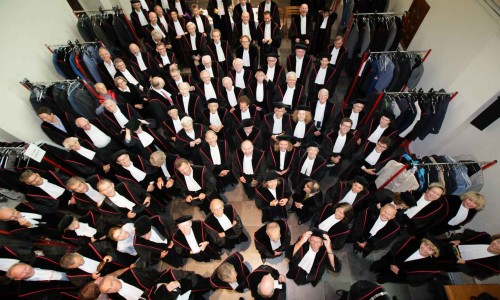‘This is how not to facilitate a meeting on a polarized topic’
-
 Foto: Johannes Fiebig
Foto: Johannes Fiebig
OPINION - Vague ground rules and no clear objective. According to a group of staff members, the meeting about whether or not to cut ties with Israeli universities is a textbook example of how not to facilitate dialogue on a polarized issue. “No one benefits from the absurd and bewildering course of events that took place on Monday.”
Facilitating a meeting on a polarized topic is a task that comes with both huge opportunity and huge risk. In response to the recommendation published on April 1 by the Advisory Committee on International Collaborations, the Executive Board invited staff and students to ‘a dialogue on the committee’s advice’ on April 7.
Based on literature on what conditions are needed to hold space for dialogue in the face of change and conflict (cf Wise and Noble 2016, Gattenhof et al 2021, Shea 2024, Van Houte and Rast 2024), we can clearly see what went wrong during Monday’s ‘dialogue’.
-
No clear goal
First, the goal of the meeting is completely unclear. The invitation speaks of “enter[ing] into dialogue about this recommendation” and to “to share ideas about the recommendation with the Executive Board”. At the start of the meeting, the president of the CvB says: “Before making a decision, we are interested in hearing your opinion, what you think needs to be altered”. The moderator adds: “At today’s meeting we want to hear as many different opinions [as possible].”
This goal of collecting opinions, with all the facts already on the table and amidst the horrifying daily news of death and destruction in Gaza, is greeted with great cynicism. Apart from the odd colleague that comes out of his office for the first time in 17 months to see what an activist looks like, most people in the room are exhausted from protesting, arguing, petitioning, educating and ‘participating’, yet feel the burden of letting their voice be heard once more at the dialogue meeting. A participant asks: “What more information do you need? Opinions are different than the facts given by the committee”. NRC reports: “But how to discuss a genocide? (…) there’s been enough talking, is the general opinion”. ANS concludes: “The CvB cannot indicate what it is looking for, but still the collecting of information will take weeks”.
-
Unclear rules of engagement
The rules of engagement are also unclear. The rules as outlined beforehand were: access only after registration and based on staff- or students’ pass; come on time; large bags not allowed; and no video- or audio recordings. At the start of the meeting, a number of additional spelregels (rules of the game) are outlined: keep your contribution short (about 6 sentences), and be respectful. Upon entering, participants are unexpectedly asked to leave banners and signs outside, but this rule is not repeated at the start of the meeting and seems like an impromptu rule that not everyone is made aware of. Participants must improvise to this fuzzy framework of rules.
-
Lack of transparency, trust and respect
The meeting starts off with a great lack of transparency, trust and respect. After the introduction, participants are asked to type a one-word reaction to the advice in Wooclap. As the colourful words start jumping around on the screen (“Cut the Ties” “Finally” and “too late” dominate), CvB members start laughing, setting the tone for the meeting. Most participants in the room are there to share their concerns on Radboud’s complicity in a genocide – why are CvB members treating this as a cute interactive game?
The next Wooclap slide asks participants to respond to a poll with the question: “Shall the board adopt the advice?”. There is immediate critique from the audience on the (intentionally?) confusing answer categories, that makes it look like the majority of people are voting ‘no’ to the question. However, the results of the poll show that the large majority of 122 out of 147 votes (83 per cent) want the advice to be adopted or more (Yes, it is sufficient (70/147); No, it goes too far (22/147); No, it is not enough (52/147); I don’t know (3/147)).
-
Selective listening and intimidating rule-keeping
The moderator and CvB members then ask the audience to elaborate on their opinions, but very soon it becomes clear that the willingness to listen to the answers is very selective. Several media note that interventions in favour of cutting ties are cut short, while a person in the audience who reads a long statement from an (Israeli) colleague is not interrupted despite the ‘short interventions rule’. When the moderator gets confronted with this bias, he simply says: ”I make the rules”.
Two students then stand up and roll out a banner and stand with it in silence. The moderator immediately intervenes and says they have 10 seconds to take the banner down, or else the meeting ends, because people might feel intimidated. He disregards the sources of intimidation and power play also present, apart from words (‘cut ties with genocide’) on a sheet: the seven police vans outside the building, the two very big security staff inside, and the airplane spreading Israeli propaganda flying overhead.
-
Extremely unsafe spaceholding
The situation then immediately and unnecessarily escalates due to the actions of the moderator and board members: the moderator immediately starts counting and threatens to end the meeting. The Rector reacts emotionally and starts shouting at the students for not following the ad hoc spelregels, which, in the words of a witness, “was like watching a small child have a tantrum.” There is shouting back and forth. Students holding the banner look calm and steadfast but also unsure how to respond to the unpredictability of the rules, the threats and screaming of the facilitators. Then, after a few minutes of chaos, in which the moderator hasn’t even finished counting to ten, the moderator says “I think it is finished.” People started walking out. Even this sudden ending of the meeting is unclear.
Conclusion: an absurd and bewildering lack of leadership
An enormous amount of harm was done when the CvB and moderator tried to facilitate a ‘dialogue’ on a polarized topic with no skills, no preparation, and no interest in doing this properly.
Nobody wins from the absurd and bewildering course of events of Monday: CvB members have publicly shown their complete, utter, and disgraceful failure to act as university leaders, and 200 students and staff who once again invested their time and energy into contributing to the meeting, were left disillusioned. Yet the message that participants of the meeting wanted to send came across crystal clear: there is no need for more talking, opinions or perspectives – there is a need for action.
As employees and members of the Radboud community, we are concerned that CvB has lost touch with reality. We need leaders that stop putting the moral burden of their job onto our students and staff. Grow up. Take leadership. And cut the ties.
To everyone in the Radboud community who cares about human rights and good governance, we ask you to raise your voice to pressure the CvB to immediately follow the advice of their own advisory committee and cut the ties with Israeli institutions – or resign; and to demand from your faculty or department to unilaterally and publicly cut the ties with Israeli institutions. Now is the time – You have a part to play.
Marieke van Houte, Faculty of Social Sciences
Juliette Alenda-Demoutiez, Faculty of Management
Laura M. De Vos, Faculty of Arts
Adriejan van Veen, Faculty of Arts
Harry Pettit, Faculty of Management
Ellen van Werkhoven, Faculty of Social Sciences
José Renkens, Faculty of Social Sciences
Adele Tufford, Faculty of Management
Margot Vandenbroucke, Radboud UMC
Gaard Kets, Faculty of Management
Anouk Evers, Faculty of Social Sciences
Francesco Battaglia, Faculty of Sciences
Marieke Woensdregt, Faculty of Social Sciences
Mathijs van de Sande, Faculty of Philosophy, Theology and Religious Studies
Eefje Derix, Faculty of Social Sciences
Tine Davids, Faculty of Social Sciences
Olivia Guest, Faculty of Social Sciences
Anya Topolski, Faculty of Philosophy, Theology and Religious Studies
Arnoud Lagendijk, Faculty of Management
And four anonymous co-signees whose names are known to the editors.
*Academic sources:
Wise, A., & Noble, G. (2016). Convivialities: An orientation. Journal of Intercultural Studies, 37(5), 423–431. https://doi.org/10.1080/07256868.2016.1213786
Gattenhof, S., Hancox, D., Klaebe, H., & Mackay, S. (2021). Nothing about us without us: Co‐creation with communities for impact assessment. In S. Gattenhof, D. Hancox, H. Klaebe, & S. Mackay (Eds.), The social impact of creative arts in Australian communities (pp. 45–60). Springer. https://doi.org/10.1007/978‐981‐16‐7357‐3_4
Shea, M. V. (2024). Developing methodologies for co‐production of knowledge: Data production and analysis in community‐based research partnerships. Qualitative Inquiry, 31(1). https://doi.org/10.1177/10778004241227268
Van Houte, M., & Rast, M. C. (2024). Applied theatre as a co‐creative methodology for more convivial knowledge production in refugee‐receiving communities. Social Inclusion, 12. https://doi.org/10.17645/si.8464



